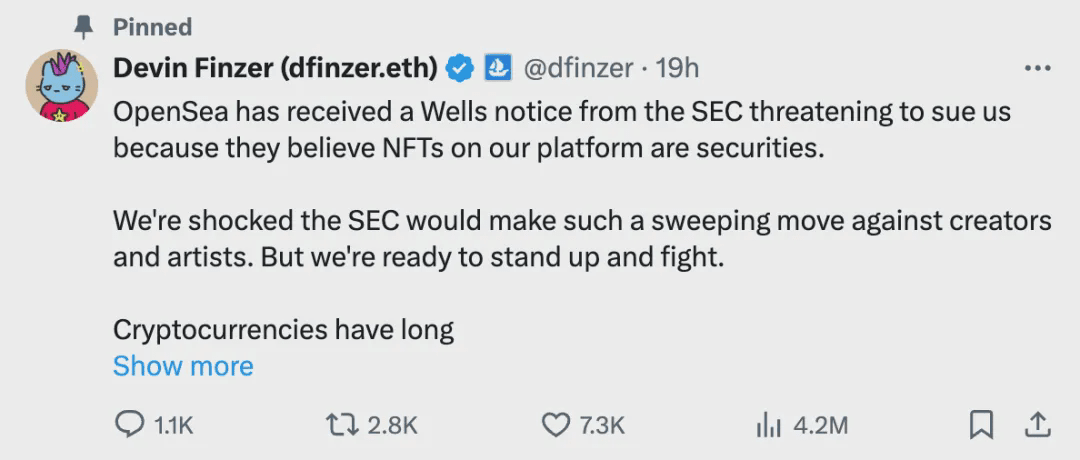
OpenSea recently received a Wells Notice from the U.S. Securities and Exchange Commission (SEC), which indicated that the SEC is considering filing a lawsuit against OpenSea.
For those who haven’t been following the recent developments of the U.S. Securities and Exchange Commission (SEC) closely, your reaction may be surprise: What could NFTs (collectibles, digital art, gaming items, and event tickets, among others) possibly have to do with securities laws?
But for those who have been closely following the cryptocurrency politics and regulatory landscape, the reaction has been more one of weariness and disappointment. Cryptocurrency has long been a focus of the SEC, but by targeting NFTs, the SEC is entering new and uncharted territory that could have potentially harmful consequences for consumers, creators, and entrepreneurs.

We believe that OpenSea operates lawfully and that our users are not trading securities when they use our platform to buy or sell NFTs, and that our users use NFTs for many reasons, such as purchasing game items or avatars for use in games, supporting favorite artists, or expressing their allegiance to their favorite sports team.
Classifying NFTs as securities would not only misunderstand the law, it would also jeopardize the livelihoods of artists, disempower collectors and gamers, and stifle innovation in the many promising use cases for NFTs.
Unfortunately, we’ve seen the SEC’s approach to enforcement hinder artistic expression, as exemplified by the SEC lawsuit filed by musician Jonathan Mann and conceptual artist Brian L. Frye, who were concerned that sales of their art and music could be considered unregistered securities offerings, which clearly demonstrates the chilling effect that misguided institutional behavior can have on creative expression and innovation.

Here are excerpts from their complaint:
"The SEC's actions threaten the livelihoods of artists and creators who are simply experimenting with a new, rapidly evolving technology or using it as a preferred medium. Artists across the country are suddenly facing the threat of the SEC attacking the distribution of their visual or musical art as an unregistered securities offering. Artists - both established and young up-and-comers - are suddenly faced with a strange question: Do they need to hire a securities lawyer to sell their art? It's hard to imagine a 21st century Buddy Guy spending that dime - and thousands of dollars - on a securities lawyer to tell him about the securities law risks of selling music to the public. American art and music will be impoverished if we erect barriers for the next generation of artists, many of whom have grown up working in the digital space..."
It’s a slippery slope: If NFTs like those showcased on OpenSea are classified as securities, where does it stop? What prevents non-NFT collectibles, such as physical or digital baseball cards, from being classified as such? Or physical or digital fine art?
As Mann and Frye’s complaint states:
“NFTs are often compared to physical art and collectibles, such as baseball cards, Pokémon cards, sneakers, or watches, so, as one commissioner explicitly acknowledged, the SEC’s broad interpretation of the Howey test has the potential to bring under its jurisdiction not only all digital artworks represented by NFTs, regardless of the context in which they are offered and sold, but also all artworks and collectibles that, broadly speaking, involve a person investing money in a common enterprise with the expectation of profit if the artist becomes more famous or the artwork increases in value on the resale market.”

The potential impact on creative expression was further highlighted in a dissenting opinion from two current SEC commissioners in the Stoner Cats settlement:
“If we apply securities laws to physical collectibles the same way we apply them to NFTs, artists’ creativity will wither in a shadow of legal ambiguity… Whether an artist is selling a numbered edition of a physical print for fans to display on their walls or an NFT for fans to display on social media, she deserves clear guidance on whether and how securities laws apply. Artists of all kinds have long struggled to support themselves, and NFTs offer them a potentially viable way to monetize their talent. The fact that money is involved does not turn an NFT into a security…
While the Stoner Cats NFT is updated for the digital age, it’s not dissimilar to the Star Wars collectibles sold in the 1970s. Fans were excited after the hit release of Star Wars in 1977. To the delight of millions of children that holiday season, toy company Kenner sold “early bird certificate packages” redeemable for future Luke Skywalker, Princess Leia, and R2-D2 action figures and memberships to Star Wars fan clubs. The sale of these certificates helped build a community of hardcore Star Wars fans. Did these IOU certificates, which could be resold, constitute investment contracts? Based on an analysis of today’s enforcement action, the SEC should have swooped in to save those kids from Star Wars mania.”
To ensure creators can continue to innovate without fear, OpenSea has pledged $5 million to cover legal fees for NFT artists and developers who received Wells’ notice.
We hope the SEC will reconsider its position and approach this issue with the openness it deserves, but until then, OpenSea remains committed to defending our vision for a better Internet — one that empowers individuals and fosters creativity, rather than stifling it with unnecessary regulatory burdens.

OpenSea content you care about
Explore | Collect | Sell | Buy

Bookmark and follow OpenSea Binance Channel
Get the latest news

